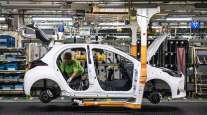Chips Shortage Hits Global Automakers

[Ensure you have all the info you need in these unprecedented times. Subscribe now.]
A semiconductor shortage is pinching some of the world’s biggest auto manufacturers, costing Daimler AG, Nissan Motor Co., Honda Motor Co., Ford Motor Co. and Fiat Chrysler Automobiles NV production for a range of cars.
Mercedes-Benz maker Daimler joined its German peer Volkswagen AG in announcing it’s affected by the industrywide supply bottleneck, without quantifying the impact. Honda said it will cut domestic output by about 4,000 cars this month at one of its factories in Japan, while Nissan is adjusting production of its Note hatchback model.
In North America, Ford is idling a sport-utility vehicle factory in Kentucky the week of Jan. 11, pulling forward previously planned downtime due to the chip shortage. Fiat Chrysler is temporarily closing a Canadian plant and delaying the restart of output at a Mexican Jeep factory until the end of January. The moves are aimed at keeping its other North American plants running, the Italian-American automaker said in a statement.
“We are working closely with our global supply-chain network to manage any manufacturing impact caused by the global microchip shortage,” said Fiat Chrysler, which is set to merge with PSA Group after shareholders approved the plan last week.
Ford also said it is working with its suppliers “to address potential production constraints tied to the global semiconductor shortage.”
Reassigned Chip Capacity
VW, the world’s biggest carmaker, announced in December that it would need to adjust first-quarter manufacturing plans around the globe because of the shortage. The company said chip-makers reassigned some of their production capacity to consumer electronics and other sectors last year and were caught off guard by surprisingly resilient auto demand. The amount of VW car output lost could be in the low six-digit range, according to sources.
The supply-chain issue could keep the auto industry from getting off to a smooth start to the year after the coronavirus undercut output during much of 2020. Struggles to rebuild inventory in some markets led the largest U.S. car dealer and lender to complain the industry has been missing opportunities for more sales.
Honda’s Japanese peer Suzuki Motor Corp. also is altering output, though there’s no plan at this point to idle factories, a spokesperson said. A Subaru Corp. representative said it’s been dealing with some parts-supply delays and may adjust output.
Replacing Models
“The spread of the coronavirus has impacted procurement in semiconductors and related parts,” a Honda spokesperson said Jan. 8. “We will address this issue by adjusting production and replacing car models.”
Honda will trim output at its Suzuka plant, located in Japan’s eastern Mie prefecture. The plant makes the Fit subcompact, which is also marketed as the Jazz. The chip shortage could potentially impact tens of thousands of vehicles in the March quarter, Japanese business newspaper Nikkei reported, citing an unidentified source.

How can we control an unruly trucking tech stack and streamline fleet management practices? Host Seth Clevenger speaks with Ray Greer, CEO of Omnitracs, which acquired SmartDrive last year. Hear a snippet, above, and get the full program by going to RoadSigns.TTNews.com.
Nissan’s Oppama plant in Japan will reduce Note production this month, a spokesperson said, without giving details. Nikkei said the company would cut output to 5,000 cars a month, from 15,000.
Cars use chips for functions as simple as opening the trunk to more complicated tasks like driver assistance systems. Electric vehicles usually pack more of them than models powered by combustion engines.
Limit Impact
Robert Bosch GmbH and Continental AG, Europe’s largest car-parts makers, acknowledged the chip-shortage issue in December after VW’s announcement and have been trying to limit the impact on customers.
BMW AG said it’s in regular contact with its suppliers about the issue, though it hasn’t yet had to reduce or stop car production.
Peugeot maker PSA Group has not been affected, a spokeswoman said Jan. 8.
General Motors Co. said it faces no current impact on output but is looking for ways to prevent a shortage at its plants.
“We are aware of the increased demand for semiconductor microchips as the auto industry continues its global recovery. Our supply-chain organization is working closely with our supply base to find solutions for our suppliers’ semiconductor requirements and to mitigate impacts on GM production,” it said in a statement.
Shiho Takezawa, Christoph Rauwald and Keith Naughton were the primary contributors to this report.
Want more news? Listen to today's daily briefing:
Subscribe: Apple Podcasts | Spotify | Amazon Alexa | Google Assistant | More




